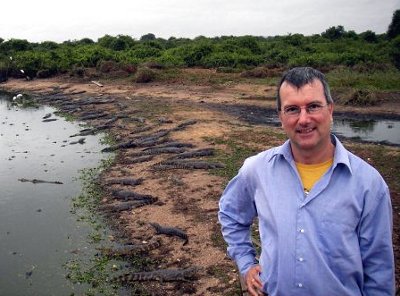
Karl Wantzen
(Université de Tours, France)

BIO
Address : CNRS UMR CITERES
Université François Rabelais
Parc Grandmont 37200 Tours, France
email: karl.wantzen@univ-tours.fr
phone: 0033-2-4736-7425 fax: 0033-2-4736-7083
Being raised at the borders of the Rhine, Karl M. Wantzen is a ‘naturally born river ecologist’. After studying biology at Mainz and Konstanz universities, he accepted a position at the Tropical Ecology Group of the Max-Planck-Institute for Limnology, to work on stream ecology in the Brazilian Cerrado (PhD thesis, 1997), and in the following on the ecology of the Pantanal floodplain and the Paraguay River with foci on foodweb, organic matter processing, and sustainable management. Executive coordinator of the Pantanal Ecology Project (1994-2001, BMBF/CNPq) in cooperation with the Federal University of Mato Grosso, where he continues to teach in the MSc. and PhD course in Ecology and Conservation of Biodiversity and develop cooperation projects until today (see www.carbiocial.de and http://www.cnpq.br/programas/ inct/ _apresentacao/inct_areas_ umidas.html). Return to Germany in 2001, where he coordinated the “Worldwide Decomposition Experiment” in tropical streams, founded the “Aquatic-Terrestrial Interaction Group” at Konstanz and performed research on invasive species and organic matter processing. Habilitation thesis on "Aquatic-terrestrial interactions in tropical riverscapes" in 2007. Since 2010, he holds the position of a Professor in Aquatic Ecology, Université François Rabelais, Tours, France, where he continues to work on tropical ecology (Brazil, Argentina, Colombia, and river and wetland restoration in France (cooperative research center CNRS UMR CITERES), teaches in the Master course “IMACOF” (Ecological River Management) and prepares the Master Course “IMACOF international” (restoration of tropical streams and wetlands, begins in 2014). Author of ca. 70 scientific publications. Editor and co-editor of international scientific journals and books, including the series “Aquatic Biodiversity in Latin America” (http://www. pensoft.net/series.php?ser=729) and the Book “Ecology of the Pantanal” (http://www.pensoft.net/book/10634/).
ABSTRACT
The Pantanal: South-Americas hydrological, biogeochemical and biogeographical turntable
Karl M. Wantzen, University of Tours, CNRS UMR CITERES, karl.wantzen@univ-tours.fr
The Pantanal is a large seasonal floodplain in the center of South America. Formed by Upper Paraguay River and its tributaries in Brazil, Bolivia, and Paraguay, it is one of the largest contiguous wetlands in the world. It harbors a great diversity of organisms and it is an ark for large populations of species that are rare in the Americas. The Pantanal fulfills a large range of ecosystem services that are essential for humanity, e.g. the flood retention of 3 months and thus a desynchronisation of the floods of the Paraguay and Paraná Rivers above their confluence. Due to the wet-and-dry climate of this seasonal floodplain system, plants, animals, and local human populations show an impressive range of adaptations to the floodpulse, drought, and even fire. Organic matter is processed and transferred very quickly in the aquatic-terrestrial interface at biotic and biogeochemical hot spots and hot moments. The adaptive traits are expressed by a high biological and cultural diversity and a high degree of ecological sustainability of traditional land use types. However, the geopolitical setting of the Pantanal makes it an object of transcontinental development projects (roads, waterways, and gas pipelines) and regional industrial projects (agroindustry, iron ore processing) that threaten its ecological integrity. Major impacts also result from the land use change in the strongly fragmented agroscapes and the increasing number of hydropower dams in the Upper Paraguay Basin that disconnect the migratory pathways of fish and terrestrial animals between the Pantanal and the Cerrado and that change the hydrological and sedimentary budget of the floodplain. Further development of regional and transregional integrative land use strategies in the Pantanal, including a science-based conservation strategy are needed to warrant the future of one of the most impressive World Heritage Sites by UNESCO.
